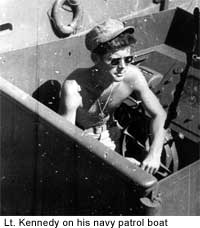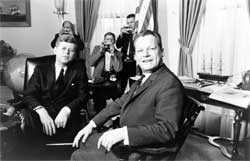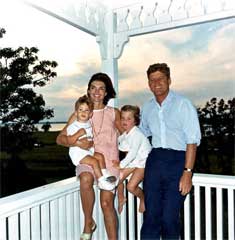| John Fitzgerald Kennedy, a Democrat, was elected the thirty-fifth President of the United States (1961-1963). This handsome, eloquent congressman defeated Richard Nixon for the presidency, partly as a result of the first televised debates. Born into the family of wealthy financier, Joseph Kennedy, on May 29, 1917, in Brookline, Massachusetts, John Kennedy was the first President born in the 20th century.

In 1953, he married elegant socialite Jacqueline Lee Bouvier. This charismatic young couple created the aura of what one reporter called "Camelot" from a Broadway play of the same name.
While recovering from a spinal operation in 1956, Jack Kennedy had written "Profiles in Courage, " which contained biographical sketches of political heroes, and for which he received a Pulitzer Prize in 1957. Kennedy became, at the age of forty-three, the youngest man, as well as the first Roman Catholic, to be elected to the United States presidency.

 Kennedy graduated from Harvard University in 1940, and became noted for "Why England Slept," a publication he wrote about Britain's lack of preparedness at the onset of World War II. Later to emerge as a war hero, initially Kennedy was turned down by the army because of a back injury. After doing special exercises, he finally passed the United States Navy physical examination and was given the command of a PT boat in the Pacific. He was distinguished for bravery after rescuing several crewmen when his boat was run over by a Japanese destroyer off the Solomon Islands. For four days they swam. They were finally rescued after a message Kennedy had carved into a coconut was found. For his heroic acts he received both the Purple Heart and the Navy and Marine Corps Medals. Kennedy graduated from Harvard University in 1940, and became noted for "Why England Slept," a publication he wrote about Britain's lack of preparedness at the onset of World War II. Later to emerge as a war hero, initially Kennedy was turned down by the army because of a back injury. After doing special exercises, he finally passed the United States Navy physical examination and was given the command of a PT boat in the Pacific. He was distinguished for bravery after rescuing several crewmen when his boat was run over by a Japanese destroyer off the Solomon Islands. For four days they swam. They were finally rescued after a message Kennedy had carved into a coconut was found. For his heroic acts he received both the Purple Heart and the Navy and Marine Corps Medals.
Kennedy was returned home for medical attention. After his recovery he entered politics. A Democrat, he was elected to the United States House of Representatives in 1946. While serving as a representative, he focused mainly on domestic issues. In 1952 he was elected to the United States Senate, and in 1958 he was reelected with the largest margin of victory ever recorded in a Massachusetts senatorial contest.
After not being nominated Adlai Stevenson's running mate in 1956 as he had hoped, Jack Kennedy began preparing himself for the 1960 Presidential election. During the 1960 campaign, the issues of defense and economic stagnation were raised during televised debates. Sixty-nine million people voted in that election, setting a new record. Kennedy won with a narrow margin of only 113,000 votes in one of the closest elections in the nation's history.

 His election began a period of optimism and idealism in the United States. He challenged the nation in his inaugural address with the famous phrase "Ask not what your country can do for you; ask what you can do for your country." He established the Peace Corps and was a strong advocate for Civil Rights reform. In foreign affairs, things got off to a rocky start, when he approved the failed invasion of the Bay of Pigs, a major embarrassment. He laid the blame for this fiasco at the feet of the CIA Director and fired him. Kennedy's concern about the potential spread of Communism led him, in 1961, to establish the Alliance for Progress that was designed to give aid and to support the economic health of Latin America. His election began a period of optimism and idealism in the United States. He challenged the nation in his inaugural address with the famous phrase "Ask not what your country can do for you; ask what you can do for your country." He established the Peace Corps and was a strong advocate for Civil Rights reform. In foreign affairs, things got off to a rocky start, when he approved the failed invasion of the Bay of Pigs, a major embarrassment. He laid the blame for this fiasco at the feet of the CIA Director and fired him. Kennedy's concern about the potential spread of Communism led him, in 1961, to establish the Alliance for Progress that was designed to give aid and to support the economic health of Latin America.
Redemption came later when, in what came to be known as the Cuban Missile Crisis, Kennedy forced Soviet Premier Nikita Khrushchev to remove Soviet missiles from the island of Cuba, only ninety miles away. Kennedy put up a blockade around Cuba, not allowing the Russian ships to enter. It was one of the most tense times in history, as the world stood at the brink of nuclear war. At the eleventh hour they turned around and war was prevented. Khrushchev agreed to remove the nuclear weapons from Cuba in exchange for the United States removing the blockade and Kennedy's promise not to invade Cuba. In 1963 a hot line was established between Moscow and the United States so the leaders of the two super powers could communicate in times of crisis.
When a wall separating East and West Berlin was built, German soldiers blocked the route through East Germany until Kennedy sent 1,500 troops in to reopen it. The famous Checkpoint Charlie was made to allow passage from East to West. This was a personal and political victory for Kennedy. The Soviet Union and Great Britain agreed on a nuclear test-ban treaty in July of 1963.
 Kennedy's domestic policies were called the New Frontier. He strongly supported space exploration and the Civil Rights movement. It was during the Kennedy administration that Alan Shepard became the first man to go into space and John Glenn as the first to orbit the Earth. (Glenn returned to space in 1998 on the now famous space shuttle). Kennedy's domestic policies were called the New Frontier. He strongly supported space exploration and the Civil Rights movement. It was during the Kennedy administration that Alan Shepard became the first man to go into space and John Glenn as the first to orbit the Earth. (Glenn returned to space in 1998 on the now famous space shuttle).
When his major proposals for economic stimulus, tax reform, aid to education, and broadened welfare got bogged down in Congress, Kennedy said, "Every President must endure a gap between what he would like and what is possible." He was successful, however, in getting the steel industry to maintain prices, and he strongly supported the race to the moon. Kennedy supported integration in schools and sent troops to put down riots after the United States Supreme Court ordered the University of Mississippi to accept an African American student. Robert Kennedy, the President's brother, was his Attorney General, and he took the challenge of Civil Rights very seriously. Both of the Kennedy brothers felt strongly that African American's should have the right to vote, to attend public school, to have equal access to jobs, and to have access to public accommodations. Much of this was accomplished with the Civil Rights Act of 1964.
The Kennedy's brought culture to the White House. They held events such as a dinner for all American Nobel Prize winners. They renovated the White House, and the First Lady gave a televised tour to the American people.
While campaigning in Dallas on November 22, 1963, Kennedy was shot in the head, and rushed to Parkland Memorial Hospital, where he was pronounced dead. Lee Harvey Oswald, was captured a few hours later and accused of the crime. He was killed two days later when he was shot on national television by a man named Jack Ruby.
There are often comparisons made between John Kennedy and Abraham Lincoln. Lincoln was elected in 1860, and Kennedy was elected in 1960. They both have last names composed of seven letters. Each was killed on a Friday while their wives were with them; both were concerned with Civil Rights; both had had their elections investigated for irregularities; both were succeeded by men named Johnson; both had served in the United States Senate; and both were carried on the same caisson. JFK.'s Vice President, Lyndon Johnson was born in 1908 and Lincoln's vice President, Andrew Johnson, was born in 1808; both Johnson's had 13 letters in their first and last names and both were southern Democrats. Lincoln's secretary, Kennedy, warned him not to go to the theater, and Kennedy's secretary, Lincoln, warned him not to go to Dallas. Lee Harvey Oswald and John Wilkes Booth were both southerners who favored unpopular ideas; both were murdered before they could be tried; each had 15 letters in his name; and they were born 100 years apart. Booth shot Lincoln in a theater and hid in a warehouse; Oswald shot Kennedy from a warehouse and hid in a theater. There was an uncirculated penny made, which was stamped with Kennedy's profile looking at Lincoln.
John Kennedy is buried in Arlington National Cemetery, where an eternal flame burns on his grave.
|

